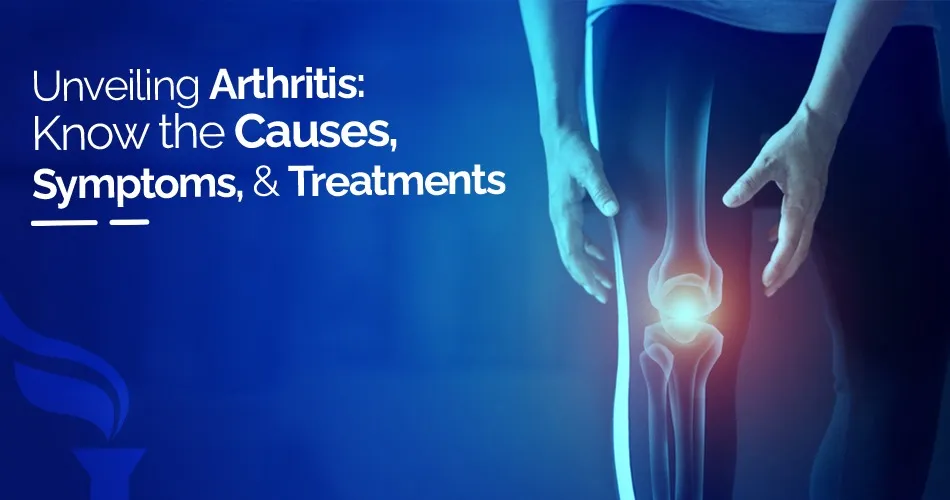Freedom from Arthritis: A Comprehensive Guide to Symptoms and Treatment
Nov 02, 2023

Arthritis is a prevalent medical condition that impacts millions of people globally. This broad term encompasses various joint disorders leading to discomfort, inflammation, and limited mobility. Arthritis can affect people of all ages, but it is more commonly seen in older adults. The most common types of arthritis include osteoarthritis, rheumatoid arthritis, and gout. Understanding the specific type of arthritis is crucial for developing an effective treatment plan and managing the symptoms effectively. In this article, we will explore the different types of arthritis, their causes, symptoms, and available treatment methods.
Let's delve into the details of some common forms of arthritis.
Osteoarthritis is the most prevalent type, characterized by the degeneration of joint cartilage and the underlying bone.
Rheumatoid arthritis is an autoimmune disease that causes joint inflammation and can affect other parts of the body.
Psoriatic Arthritis: This condition occurs in some people with the skin condition psoriasis, leading to joint pain, swelling, and skin lesions.
Ankylosing Spondylitis primarily affects the spine, causing inflammation and pain in the vertebrae.
Gout: The buildup of uric acid in the joints, which results in gout, is a form of arthritis that causes sudden and excruciating joint pain.
Sjogren's syndrome is an autoimmune disorder that primarily affects the glands that produce moisture, leading to dry eyes and mouth and joint pain.
Common forms of arthritis include osteoarthritis (OA), rheumatoid arthritis (RA), psoriatic arthritis, ankylosing spondylitis, gout, and Sjogren's syndrome. OA degenerates joint cartilage and bone, RA causes joint inflammation, psoriatic arthritis causes joint pain, spondylitis affects the spine, gout causes joint pain, and Sjogren's syndrome causes dry eyes and mouths.
Why does Arthritis occur?
Arthritis is a range of disorders that affect the joints and block the movement of the affected patient. The principal causes are broadly classified as follows:
- Wear and tear: The gradual deterioration of the cartilage that cushions the joints is a major contributor to osteoarthritis, the most common type of arthritis. This could be due to aging, joint injuries, or overuse.
- Genetics: Some people are more genetically prone to developing arthritis, making them more susceptible to the condition. Arthritis
 risk factors include variations in hundreds of genes. The majority of these genes have been linked to immunity in one way or another. Variations in human leukocyte antigen (HLA) genes, particularly the HLA-DRB1 gene, are the most important genetic risk factors for rheumatoid arthritis. The HLA genes code for proteins that aid the immune system in telling the difference between the body's own proteins and those of external invaders (such as viruses and bacteria). The effects of changes in other genes on an individual's likelihood of getting the illness seem to be more modest.
risk factors include variations in hundreds of genes. The majority of these genes have been linked to immunity in one way or another. Variations in human leukocyte antigen (HLA) genes, particularly the HLA-DRB1 gene, are the most important genetic risk factors for rheumatoid arthritis. The HLA genes code for proteins that aid the immune system in telling the difference between the body's own proteins and those of external invaders (such as viruses and bacteria). The effects of changes in other genes on an individual's likelihood of getting the illness seem to be more modest. - Infection:In rare cases, infections like Lyme disease and Gonorrhea can cause arthritis by triggering an immune response that incorrectly attacks joints, leading to inflammation and joint damage.
What are the symptoms of Arthritis?
The symptoms of arthritis can vary depending on the type and severity of the condition. However, there are some common signs to look out for:
Joint Pain: Continuous pain in joints and difficulty in movement are hallmark symptoms of arthritis.
Swelling: Inflammation in and around the affected joints can cause them to become swollen and warm to the touch.
Stiffness: Arthritis often leads to joint stiffness, making it difficult to move the affected areas and making life painful.
Decreased Range of Motion: Over time, arthritis can reduce joint flexibility, leading to a decreased range of motion.
Fatigue: Many arthritis patients experience fatigue, which can be a result of chronic pain and inflammation.
Treatment options for Arthritis
The treatment for arthritis can vary based on the type and severity of the condition. There are several treatment options available for arthritis, including both non-pharmacological and pharmacological approaches. Non-pharmacological treatments may include physical therapy, exercise, weight management, and the use of assistive devices. Pharmacological options often involve the use of pain relievers, anti-inflammatory drugs, or corticosteroids to manage symptoms and reduce inflammation. In severe cases, surgical interventions such as joint replacement surgery may be considered as a last resort.
Here are some common approaches:
- Medications: Pain relievers and anti-inflammatory medications can help manage arthritic pain and inflammation. Disease-modifying antirheumatic medications (DMARDs) are also prescribed in severe situations.
- Physical therapy can assist in improving joint function, and strengthening muscles around afflicted joints, lowering pain, and increasing mobility.
- Lifestyle Changes: Maintaining a healthy weight, remaining physically active, and guarding the joints from further damage can all help with arthritis management.
- Surgery: In severe cases of joint injury, surgical procedures such as joint replacement may be required to reduce pain and restore function.
Managing arthritis involves medications, physical therapy, lifestyle changes, and surgery. Pain relievers, anti-inflammatory medications, and DMARDs are prescribed for severe cases. Maintaining a healthy weight and maintaining physical activity can also help.
Conclusion
Arthritis is commonly diagnosed in all age groups. Understanding the causes and the symptoms, and researching treatment options are critical for properly treating this illness. If you are suffering from joint pain and stiffness, see a doctor for a complete diagnosis and treatment plan. Also, you can reach Apollo Diagnostics for a complete diagnosis. Individuals with arthritis can live full and active lives if they take the appropriate approach. We, at Apollo Diagnostics, are there to lead you to the path of recovery.
Related Blog Post
Blog Categories
- Child Health
- Mens Health
- Women's Health
- Mental Health
- Health Myths & Facts
- Fitness
- Nutrition/Recipes
- Remedies
- Weight Management
- Stress Management
- Health Supplements
- Addiction Management
- Disease Management
- Allergy
- Anemia
- Arthritis
- Asthma
- Autoimmune Diseases
- Blood Pressure
- Cancer
- Deficiencies
- Dengue/Malaria/Chikungunya
- Diabetes
- Eye Problems
- Heart Diseases
- Hepatitis
- HIV/AIDS/STD
- Hormonal Imbalance
- Infection/Flu/Viral
- Kidney
- Liver
- Menstrual Problems
- Pregnancy
- Skin & Hair Problems
- Stomach Ailments
- Thyroid
- Others
- Health Checkups
- Diagnostics/Pathology
- Lifestyle & Wellness
- Covid
- Medical Tests
- Cholesterol
- Health Tips
- Parent Care/Old Age
- Lungs
- Food Intolerance








